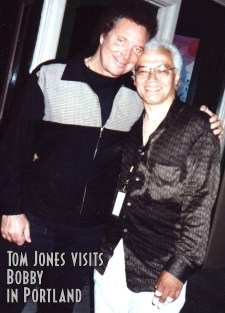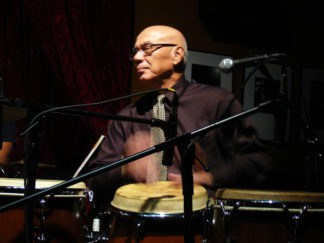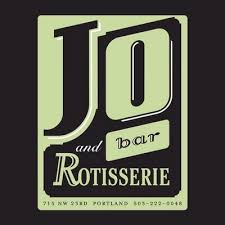“I’ve Seen a Lot”
Percussionist Bobby Torres Reviews a Life in the Biz
by Mike Walker, Crystal Ballroom
Republished from “Resonance from the Festival,” the Official McMenamins Newspaper, September 2000, with permission
Bobby Torres is one of those people who blend in with the scene so well that you’d never guess the depth of his experience as a musician. Whether drumming with the McMenamins Marching Band, sitting in with various name acts in Portland, or leading his own Bobby Torres Ensemble, his role is that of quiet support, complementing the sound around him with an adroit percussive ability. He sits calmly behind his congas, playing just the right patterns to the music and eyeballing the goings-on around him with a happy confidence that is one of his defining traits.
 So anyone who ventures to his website (www.bobbytorres.com) and views his credentials might well be surprised to discover a 30-year professional history that spans the globe. Indeed, Bobby’s records of performing, recording, teaching, filming, touring and community service rival most in the music industry today. As the eye scans these lists, plenty of notable names pop out: Dr. John, Tom Grant, Jackson Browne, Arlo Guthrie, Kenny Rogers, Joe Cocker, Tom Jones, Etta James… the names go on and on. And few of Portland’s own jazz notables have missed the opportunity to call on Bobby to help out on one project or the other.
So anyone who ventures to his website (www.bobbytorres.com) and views his credentials might well be surprised to discover a 30-year professional history that spans the globe. Indeed, Bobby’s records of performing, recording, teaching, filming, touring and community service rival most in the music industry today. As the eye scans these lists, plenty of notable names pop out: Dr. John, Tom Grant, Jackson Browne, Arlo Guthrie, Kenny Rogers, Joe Cocker, Tom Jones, Etta James… the names go on and on. And few of Portland’s own jazz notables have missed the opportunity to call on Bobby to help out on one project or the other.
This is simply because Bobby does his job well. As a percussionist, he takes the elements of the groove and gives them a distinct yet subtle backbone. You might not even notice the effect unless it was to suddenly disappear, leaving a decidedly flatter and less dynamic rhythm in its wake. That gracious talent, with a keen sense of arrangements and repertoire, has made Bobby a favorite in Portland’s Latin and jazz scenes.
One of three children, Bobby was raised in New York City by parents who had immigrated to America from Puerto Rico. He played in local clubs until he got picked up by Joe Cocker in 1969, after which he was propelled into the world of rock ‘n’ roll. He spent the ’70s in Los Angeles, answering constant streams of calls for shows and recording sessions, and finally relocated to Portland in the early ’80s when the L.A. lifestyle was getting the better of him.
Starting in 1980 and for the next 11 years Bobby stuck to one steady gig, touring the planet with entertainer Tom Jones. When the ‘80s ended so did his duty with Jones, and Bobby settled into Portland’s music community where, over a span of ten years, he has etched his name into the musical landscape.
Now, with the national rise of Latin music, the Bobby Torres Ensemble is finding itself in high demand in two rich Portland markets: a jazz scene that respects the twists that Bobby puts into his arrangements, and a dance community that’s compelled by Latin grooves with jazz inflections.
Bobby’s ensemble has been a monthly feature of the Crystal Ballroom’s Salsa con Sabor program, staged weekly in Lola’s Room on the building’s second floor. Over just the past month, these nights have seen a dramatic increase in attendance, with Bobby’s nights being the most popular by far.
Bobby has played the Crystal so often that he’s practically part of the family here, and with things going so well, I invited him to join me and my tape recorder at Cassidy’s for a drink or two. He obliged happily, and, over the course of the night, I wasn’t surprised to learn that what Bobby values from his experiences is not so much his brushes with fame as the lessons learned and the memories of good relationships with good people.
I had no sooner clicked on the tape recorder than Bobby very purposefully started things off:
Bobby Torres (BT): (Picking up recorder) I’d like to say right off the bat that Mr. Mike McMenamin is my hero for putting my band in front of Tito Puente.
Mike Walker (MW): Wait a minute, Bobby. I ask, you answer.
BT: (Laughs) Okay.(It just has to be mentioned that Bobby Torres has one of the most amazing laughs. It’s a one-of-a-kind, indescribable utterance, something between a hyena and a machine gun. Considering Bobby’s collected, smooth way of talking, it absolutely adds to the spirit of the conversation.)
MW: So I take it that Tito was an idol for you.
BT: Oh yeah, man. I’d seen Tito since I was 16. Met him tons of times. He’s a god! Tito had an album in the ’50s that was considered the Bible – in New York City, at least. Any time I had off, I’d go see him.
MW: Did you ever play with him?
BT: Well, Tito asked me to sit in once in the ’80s. I was playing with Tom Jones at the time, and he asked me because he knew who I was, from playing with Tom. But to play authentic Latin, you have to be playing, practicing all the time and, you know…
MW: You humbly bowed?
BT: Yeah. Tito… he was like a god, man.
MW: It was while you were still in New York that you met up with Joe Cocker, right?
BT: I saw him in 1969 playing at Fillmore East, playing with Rod Stewart and the Faces. He had the hit “Feelin’ Alright,” which was recorded with a conga player, but when he played it live he didn’t have a conga player. So he was billed at the Fillmore East, and he went to Ungano’s where I was playing on a Monday night, and asked me if I could sit in. And I said, “Sure.”
MW: He didn’t have to twist your arm, eh?
BT: No! He didn’t even want to hear me play. I says, “Don’t you wanna hear me play?” He says, “Okay.” So I played a little and he says, “Alright.” So I went back every night and played that one song with him. He went home to England, and when he came back I hooked up with him again, just for that one song. And when he would introduce me, he’d say, “Give a hand to Bobby, please.” So a lot of people thought my name was Bobby Please. (Laughs) He made me a permanent member of the band. Took me to California from New York, and I started fittin’ in on most songs.
MW: And he took you to Woodstock, too, right?
BT: Yeah, after I played with him in Woodstock, everybody wanted me to play with them, whether I was talented or not… didn’t matter. (Laughs) I was a Mad Dog!
MW: Was that your big slingshot to the big leagues?
BT: Yeah, I moved to L.A. I was there for 11 years. The first call I got was from Jackson Browne. He ran into me and started saying, “Bobby Torres! Mad Dog! Bobby Torres! I want you to record on my album!” He was still up and coming at that time (1970), but he had a name. A friend of mine, Luís Conte, was playing percussion with Jackson recently, and he was up here doing a show, and he had me come out and play with him on a song.
MW: So how was life in L.A. during the ’70s?
BT: Well, I was depending on gigs and recording sessions. Sometimes it was not as plentiful, and sometimes it was amazing, people would call me out of the blue – Kenny Rogers, Paul Williams, etcetera. I even played with Linda Carter. She was a singer; she played Caesar’s Palace. She had the whole beginning of her T.V. show on a big screen behind her, and then we’d start playing. They had all these dancers as part of the show.
MW: Hmm. Very L.A.
BT: Yeah! Very L.A. It was amazing. Lots of parties. (Pause) I went to a party one time at George Harrison’s house. Mick Jagger, Peter Lawford, Billy Preston, Ricky Nelson, George Harrison, it was like wall-to-wall stars. Bianca Jagger was there… she was gorgeous… she was GORGEOUS! She came up and said she’d always wanted to play congas…
MW: …and you said?
BT: I was pretty speechless.
MW: Who are you still in touch with?
BT: Joe Cocker, mostly. Also (Motown producer) Johnny Bristol. He’s a singer, songwriter, producer with no musical training. Taught me a lot about production and songwriting. A lot of those producers at that time didn’t have a clue. And of course I’m still in touch with Tom Jones.
MW: That’s a chapter in itself, isn’t it? I noticed from your bio that the ’70s was a whirlwind of activity for you, but that in the ’80s you pretty much stuck with Tom Jones.
BT: Yeah, well, L.A. at that time wasn’t a good environment for the kids. I also needed a steady income instead of the money that came from depending on gigs and recording. I was driving a cab, in fact, when Tom called me up. So I got the job with Tom Jones and moved to Portland because my wife was from here. I was on the road with Tom for nine months a year.
MW: What was it like touring with Tom Jones?
BT: He’s one of the greatest guys I ever met. Really, man… so down to earth. That was the longest gig I ever had in my life. This guy is so down to earth, compared to anybody I’ve ever played with… and I’ve played with quite a bit. (Laughs) I mean, as far as relating, you have other acts where you can’t talk to them. You have to go through another person to say hello. I got to be good friends with Tom though.
MW: Did he have a kind of family attitude about the band, then?
BT: Yeah, he’d throw parties for whosever birthday it was. Everyone would chip in to buy gifts, the girls would buy the gifts, have a party, take pictures. Man, this guy’s phenomenal. Playing with Tom Jones, I learned a lot about attitude. One time we were rehearsing a tune that the drummer couldn’t really get. He was an English drummer, and after about an hour I was really getting pissed off, like “How simple could this be?” But Tom, it didn’t bother him at all. He said, “Let’s just move on to another song.” When I saw that, being from New York, I was pretty impressed by how cool he stayed.
MW: Did he measure up to others in terms of his performance?
BT: Oh, yeah. He was an amazing performer. We did “Green Green Grass of Home” hundreds of times, of course. But we did it once in Wales with the Welsh Choir backing it. One hundred guys… I was bawling after that. Those highlights, you know, are really unforgettable. I’m lucky, I’m real lucky.
MW: You mentioned that you’re still in touch with him.
BT: Yeah, yeah, I just saw him last November. And the last time he was in Portland was when I was playing with my band at Key Largo. Tony (the club’s owner) asked me to try to get him down to see us, as I’d be the toast of the town. I felt funny doing that, though, you know? But I go out and see him in Seattle, where he was playing before Portland, and I ask him to come see me. He says, “Yeah, I think so.” Then when he gets to Portland he says that he has a sore throat, so might not make it. I says, “Cool, no pressure.” Well, Tony had meanwhile put it all over town that Tom Jones was going to show up, and so on Sunday night the place was packed when we got there. It was packed. Then all of a sudden three buses show up: Tom and his bus, the crew bus, and the band bus. He brought everybody.
MW: Did he hang for a while?
BT: The whole set!
MW: So after all that time with Tom Jones, how did living full time in Portland suit you?
BT: It was a bad time. The old lady left, I was a Mr. Mom for a couple years. Took me a long time, but I eventually got new perspectives, and that’s when I started my own band in 1992. The band evolved over the years. We were doing Latin jazz, y’know, but everybody improved in amazing ways. Four different bass players. We had another singer, before Margaret Linn joined us about two years ago. She’s so professional, she’s very cool.
MW: Are you content with what you’re doing, then?
BT: Yeah, it’s much better. I’m playing what I want to play. It’s not something that I’m hired to play that might not be too me. I’m sticking to my own material, and that’s a cool feeling.
MW: You’re one of those few bands that can play two or three nights a week in town.
BT: Yeah, and it took a long while – seven years – and it’s funny that you would think that I did have some sort of credits that it would be easier, but it wasn’t. Which is cool, in a way. Y’know, at the time I thought, “Don’t they know who I think I am?” (Laughs) But now, after going through all that, it made me feel much better. Because it’s more what I put forth rather than what I did, what I play, not who I played with. That’s why I love Portland. Not many people get the starry-eyed face… it’s a normal town, no trips.
MW: So the response to your music isn’t contrived – if you’re good, you’re good.
BT: Yeah, and not only am I playing songs that I pick, but I’m playing with my son Reinhardt (drummer for Bobby’s band).
MW: Reinhardt’s one of the best in town. You must be proud of him.
BT: Yeah, but he’s so intimidating! Jim Keltner (Joe Cocker drummer) is the only other drummer that’s intimidated me that bad. We used to play together and hang together all the time, and before each show I’d always be thinking, “Man, I hope I can keep up.” It’s like that with Reinhardt now.
MW: What a cool relationship to have with your son, playing with him live all the time.
BT: Yeah, it’s a real gift. All the kids are great. And it’s amazing how they all come together when they see each other.
MW: They obviously mean a lot to you. And now you and Reinhardt are together on your CD. That’s coming out soon, now. Happy with it?
BT: Oh, yeah! I know that it’s good. I worked hard on it, and with all my experience I’m really proud of it. Usually I’d be really critical of my own work, but I am really proud of it. It feels good to be trusted to get all these ideas out, especially with Margaret. We have some original songs on it, some standards, and one of the highlights, for me at least, is Reinhardt doing a drum solo.
MW: Portland’s been good for you, Bobby. Not as many rock gods running around, but…
BT: You know, I changed a lot over the years. I left L.A. because I was seeing so many people get hurt. You dream of being in a situation of being famous or recognized for your talent, and a lot of them get into it and you fall into a money trap, or you fall into a career trap, where it’s not what you thought it was. It’s a big disillusionment for people so young. I’ve seen a lot.



Stay tuned-in for our shows
Join our mailing list. Know whenever we are playing.
You have Successfully Subscribed!